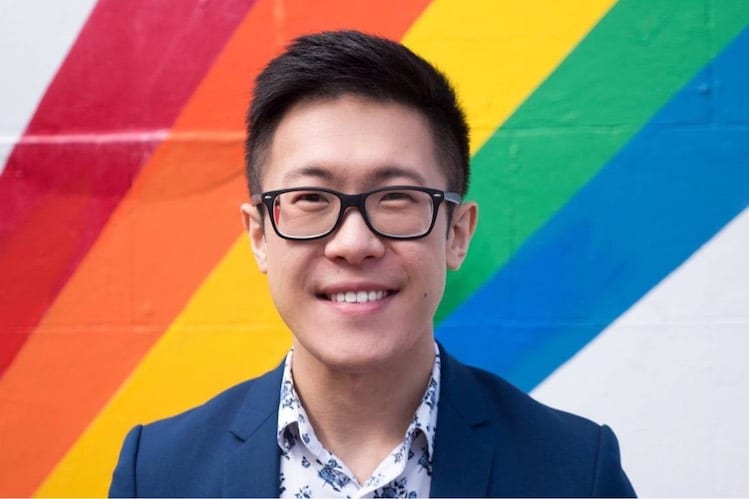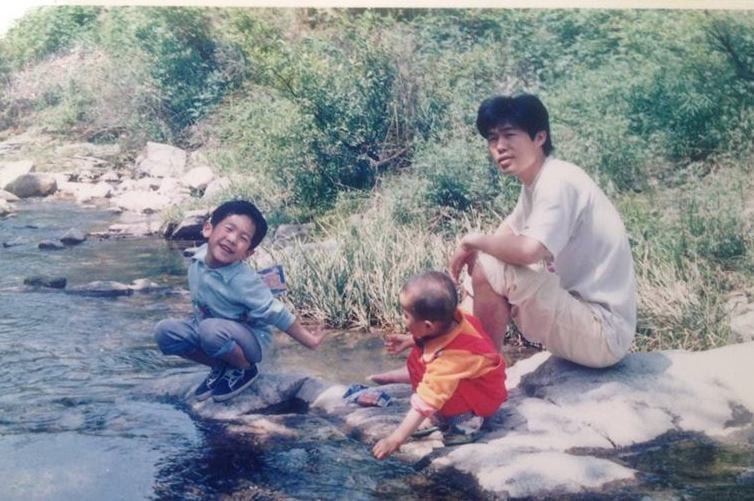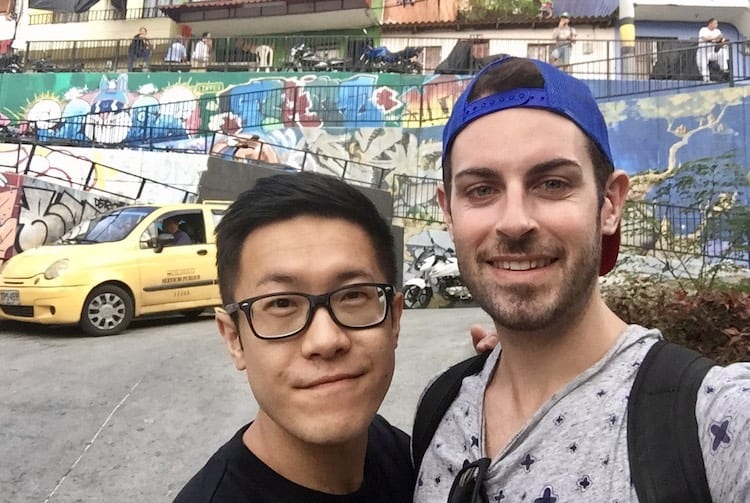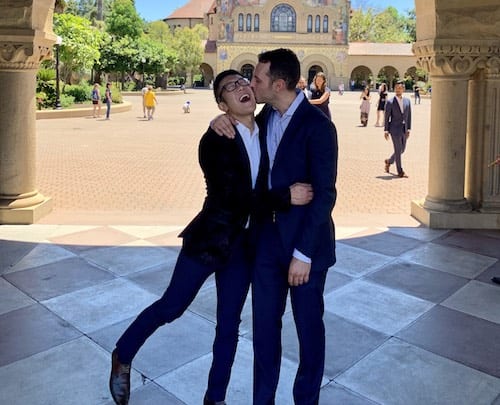Brain scans help researchers untangle the truth about lie detection

Alan Man is co-president of Q@Haas, the student-led club for LGBTQ students and their allies.
Alan Man, MBA 20, has made inclusion his passion. The son of Chinese parents who immigrated to New Zealand when he was five, Man is a student board member at the Center for Equity, Gender, and Leadership (EGAL) at Haas, the recipient of a fellowship from the national LGBTQ leadership organization Reaching Out, a Haas Student Ambassador, and co-president of Q@Haas, the Haas student-led club for LGBTQ students and their allies.
We spoke with Man, who has a background in law and accounting and is working in diversity & inclusion at a fintech company this summer, about struggling emotionally as a teenager, building support networks to serve others, and promoting inclusion at Haas and beyond.
What was your experience growing up?
Growing up in Auckland, I had a typical Chinese-immigrant upbringing. Still, New Zealand is such a beautiful, safe country to grow up in. I feel super-privileged and grateful to my parents to have sacrificed so much in order to give me all the opportunities to succeed. Despite the fact I was this short Asian kid with glasses, braces, acne and was kind of geeky, I managed to make it through OK.

Alan (left) with his father and cousin in China before the family immigrated to Auckland, New Zealand.
How old were you when you figured out that you might be gay?
As soon as I hit puberty, I knew something was different about me. In psychology, there is this concept of the seven stages of grief. I went through pretty much all seven stages; denial, anger, depression, to try to come to terms with my sexuality. I was in denial for most of my teenage years. For example, I went to a traditional all-boys high school that was hyper-masculine. If you crossed your legs, you heard, “Oh, don’t do that, that’s gay” or, “that hand movement was gay, that’s disgusting.” It was not conducive to figuring out who I was. To be frank, it was kind of a horrible experience.
What was the process of coming out like?
Once I started university, that’s when I started to be more comfortable with who I am. I was an early-entry university student and it was wonderful, sort of like a coming-of-age experience at 17. As I began to gain confidence, make friends, and figure out where I fit in. I believe we all go through this process. I started to slowly accept my sexuality. The first step was acknowledging it myself and then once I came to terms with it internally, it was time to start coming out to friends when I was 20. That was such a big deal at first. It was filled with so much dread and anxiety and fear of being rejected. There was the time I told someone in confidence, and this person went ahead and told others which was a huge betrayal of my trust. The experience taught me an important lesson about trust, about being intentional with how you share information and ultimately, about not caring so much about what others think of me.
How did coming out to your parents go?
I didn’t come out to my parents until I was 25, and only because I was going to move to Australia to be with my boyfriend of three years (now husband!). Coming out to my parents was a huge deal to me and I didn’t feel comfortable doing it for the longest time. At that point, I had already told everyone in my life, my work, friends, everyone except my parents. They grew up in a country where the common belief is that people who are gay can’t be happy because they’re ostracized by society. My mom was the one I came out to first. Even though I had already come to terms with my sexuality, I completely collapsed, crying, and I couldn’t even say the words. It was hard at first, with my parents not truly understanding and saying hurtful things without meaning to. But today, it’s all better. My parents have gotten to know my husband, who is such a kind, intelligent, thoughtful person, and they can see how happy I am. Although my extended family in China still don’t know about my sexuality or my husband, at least my parents treat him like family and I am so grateful that my parents could look at my sexuality through the lens of love, rather than the homophobia that is so pervasive in the places they grew up in.

Alan with husband, Dane Renner, in Medellín, Colombia.
Have you been open about your sexuality in your professional life?
Interestingly enough, I went straight back into the closet as soon as I started working at my first job in New Zealand at the age of 21. At the time, it made so much sense because it was a male-dominated, hierarchical firm. But when I moved to Australia, I decided to finally come out. There was no escaping the fact I had moved there for my partner and I didn’t want to lie in my interview about the reason I had moved. I had support from my managers, but unfortunately there was no support network or affinity group or employee resource group in my office. So I started one.
I wanted to make sure that my office was safe and inclusive for all LGBTQ employees. In a short space of time, we had a calendar full of events and even a budget which was a huge deal for me. The most impactful moment was when a colleague of mine came up to me at after-work drinks to tell me that he was so glad and thankful that I established the LGBTQ network. He had never understood “the whole gay thing” and it was only after attending an LGBTQ awareness training session I organized, and some self reflection, that he realized why it was important to be inclusive of LGBTQ folk and he then became one of our biggest supporters—even joining the organizing committee and contributing to the network.
Have you had fears that you think non-LGBTQ people haven’t had?
The first thing that comes to mind is holding hands in public, especially in the beginning of my relationship. My husband and I have been together for eight years now, and we held hands in public for the first time three years into our relationship, which I think would be unusual for a heterosexual relationship! I can remember it like yesterday. We held hands for what felt like 30 seconds in a street with no one present, and then immediately dropped our hands when someone walked around the corner. Even though we were probably safe, at that time it felt so risky to be open. Even to this day, outside of the Bay Area, we still get odd stares when we hold hands in public.

Alan with husband, Dane Renner, who are both from New Zealand, at a wedding at Stanford Memorial Church on the Stanford University campus.
How are you promoting inclusion outside of Berkeley Haas?
My internship this summer is at a fintech company called Credit Karma in San Francisco, working with the head of Diversity and Inclusion to drive inclusion at the company. I never imagined I’d be working on this full-time. Coming into business school, I only had exposure to consulting or other traditional post-MBA roles. However, after I did a bunch of exploring and talking to people about their careers. I decided to take a risk and explore what it means to drive diversity and inclusion at a company full-time rather than as something on the side.
How has your experience at Berkeley Haas been so far?
The Berkeley Haas community is wonderful and accepting and has allowed me to lean into my inclusion work. I’ve been privileged to come out fairly early in life, but we have classmates who are still grappling with their sexuality. Now that I’ve gone through this journey myself, I want to be a leader in the space, creating community and a safe space for other queer people—and driving other aspects of diversity and inclusion as well. As a result, I have taken on a number of leadership positions during my MBA and I am proud to share that this led to me recently receiving the Haas Student Leadership Scholarship for continuing students at Berkeley Haas, something I never expected. It is fantastic to be recognized for the contributions I’ve made to the Haas community and I am so grateful to be able to pursue my passion of creating community and driving inclusion among such an amazing group of people.
Posted in:



